Top Rankings
Laytonville Unified School District ranks among the top 20% of public school district in California for:
Category
Attribute
Diversity
Most diverse schools (Top 1%)
Student Attention
Lowest student:teacher ratio (Top 1%)
For the 2025 school year, there are 3 public schools serving 315 students in Laytonville Unified School District. This district's average testing ranking is 3/10, which is in the bottom 50% of public schools in California.
Public Schools in Laytonville Unified School District have an average math proficiency score of 22% (versus the California public school average of 33%), and reading proficiency score of 32% (versus the 47% statewide average).
Minority enrollment is 47% of the student body (majority Hispanic), which is less than the California public school average of 80% (majority Hispanic).
Overview
This School District
This State (CA)
# Schools
3 Schools
10,369 Schools
# Students
315 Students
5,826,838 Students
# Teachers
21 Teachers
268,012 Teachers
Student : Teacher Ratio
15:1
15:1
District Rank
Laytonville Unified School District, which is ranked #1367 of all 1,925 school districts in California (based off of combined math and reading proficiency testing data) for the 2021-2022 school year.
The school district's graduation rate of 80% has stayed relatively flat over five school years.
Overall District Rank
#1287 out of 1941 school districts
(Bottom 50%)
(Bottom 50%)
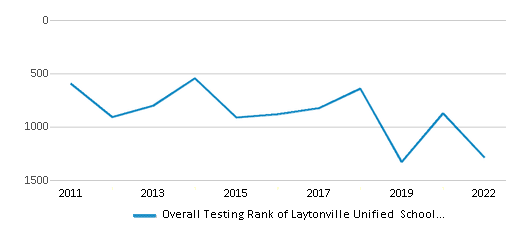
Math Test Scores (% Proficient)
20-24%
33%
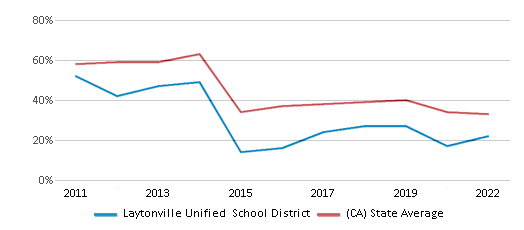
Reading/Language Arts Test Scores (% Proficient)
30-34%
47%
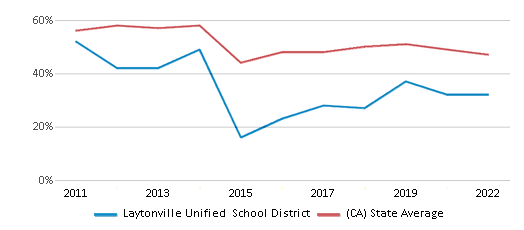
Science Test Scores (% Proficient)
30-39%
29%
Graduation Rate
≥80%
87%
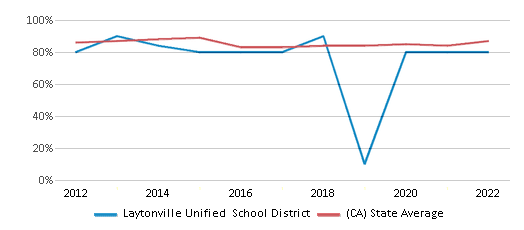
Students by Ethnicity:
Diversity Score
0.65
0.63
# American Indian Students
31 Students
25,796 Students
% American Indian Students
10%
1%
# Asian Students
7 Students
705,807 Students
% Asian Students
2%
12%
# Hispanic Students
64 Students
3,264,561 Students
% Hispanic Students
21%
56%
# Black Students
1 Student
286,112 Students
% Black Students
n/a
5%
# White Students
167 Students
1,178,558 Students
% White Students
53%
20%
# Hawaiian Students
n/a
23,731 Students
% Hawaiian Students
n/a
n/a
# Two or more races Students
45 Students
333,755 Students
% of Two or more races Students
14%
6%
Students by Grade:
# Students in PK Grade:
-
83
# Students in K Grade:
33
522,456
# Students in 1st Grade:
25
396,605
# Students in 2nd Grade:
28
414,466
# Students in 3rd Grade:
21
416,628
# Students in 4th Grade:
23
426,361
# Students in 5th Grade:
18
430,587
# Students in 6th Grade:
27
432,997
# Students in 7th Grade:
18
439,621
# Students in 8th Grade:
23
441,777
# Students in 9th Grade:
24
466,534
# Students in 10th Grade:
27
476,585
# Students in 11th Grade:
22
469,511
# Students in 12th Grade:
26
492,627
# Ungraded Students:
-
-
District Revenue and Spending
The revenue/student of $28,806 is higher than the state median of $19,974. The school district revenue/student has grown by 14% over four school years.
The school district's spending/student of $23,540 is higher than the state median of $18,396. The school district spending/student has grown by 14% over four school years.
Total Revenue
$9 MM
$116,387 MM
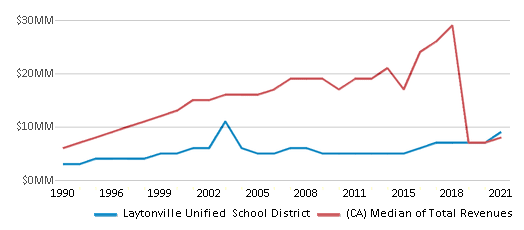
Spending
$7 MM
$107,188 MM
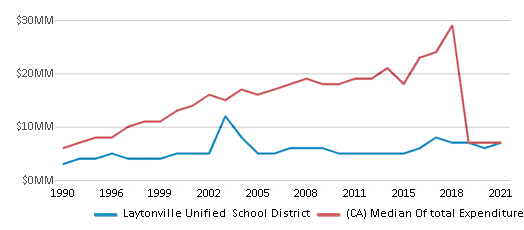
Revenue / Student
$28,806
$19,974
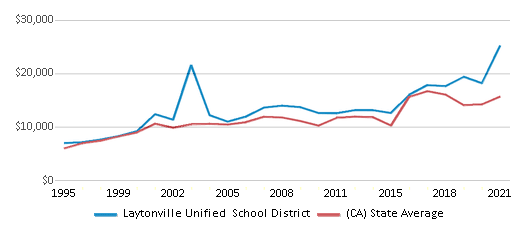
Spending / Student
$23,540
$18,396
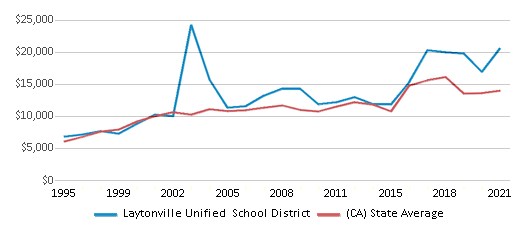
Best Laytonville Unified School District Public Schools (2025)
School
(Math and Reading Proficiency)
(Math and Reading Proficiency)
Location
Grades
Students
Rank: #11.
Laytonville Elementary School
(Math: 20-24% | Reading: 30-34%)
Rank:
Rank:
4/
Bottom 50%10
150 Ramsey Rd.
Laytonville, CA 95454
(707) 984-6123
Laytonville, CA 95454
(707) 984-6123
Grades: K-8
| 216 students
Rank: #22.
Laytonville High School
(Math: ≤20% | Reading: 21-39%)
Rank:
Rank:
3/
Bottom 50%10
250 Branscomb Rd.
Laytonville, CA 95454
(707) 984-6108
Laytonville, CA 95454
(707) 984-6108
Grades: 9-12
| 99 students
Rank: n/an/a
Laytonville Continuation High School
Alternative School
200 Branscomb Rd.
Laytonville, CA 95454
(707) 984-6254
Laytonville, CA 95454
(707) 984-6254
Grades: 9-12
| n/a students
Frequently Asked Questions
How many schools belong to Laytonville Unified School District?
Laytonville Unified School District manages 3 public schools serving 315 students.
What is the rank of Laytonville Unified School District?
Laytonville Unified School District is ranked #1367 out of 1,925 school districts in California (bottom 50%) based off of combined math and reading proficiency testing data for the 2021-2022 school year. This district ranks in the top 20% of California school districts for: Most diverse schools (Top 1%) and Lowest student:teacher ratio (Top 1%)
What is the racial composition of students in Laytonville Unified School District?
53% of Laytonville Unified School District students are White, 21% of students are Hispanic, 14% of students are Two or more races, 10% of students are American Indian, and 2% of students are Asian.
What is the student/teacher ratio of Laytonville Unified School District?
Laytonville Unified School District has a student/teacher ratio of 15:1, which is lower than the California state average of 22:1.
What is Laytonville Unified School District's spending/student ratio?
The school district's spending/student of $23,540 is higher than the state median of $18,396. The school district spending/student has grown by 14% over four school years.
Recent Articles

Sexual Harassment at Age 6: The Tale of a First Grade Suspension
A six-year old in Aurora, Colorado, was suspended after singing an LMFAO song to a little girl in his class and reportedly “shaking his booty.” We look at the case and the sexual harassment problem in public schools today.

How Scaffolding Could Change the Way Your Child Learns
This article explores the concept of instructional scaffolding, a teaching method that enhances learning by breaking down complex tasks into manageable parts. It highlights how scaffolding supports students in developing critical thinking skills and becoming more independent learners. The article discusses the benefits of scaffolding, including improved engagement and reduced anxiety, and provides strategies for its implementation across various educational levels.

February 05, 2025
Understanding the U.S. Department of Education: Structure, Impact, and EvolutionWe explore how the Department of Education shapes American education, from its cabinet-level leadership to its impact on millions of students, written for general audiences seeking clarity on this vital institution.





